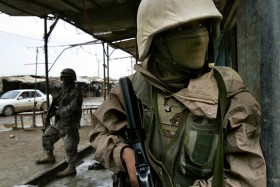2012 Conflict in the 21st Century

|
|
EPIIC is open to undergraduate and graduate students of all majors • EPIIC coursework can count toward credit in many majors • Full Credit/Letter Graded
Register at SIS Online: September 6
COLLOQUIUM OVERVIEW
More than 1.5 billion people currently live in countries directly affected by conflict, with millions more feeling the indirect consequences. While inter-state and intra-state violence have seen recent declines, violence is still on the rise, compromising peace, security and development. The 2011-12 Education for Public Inquiry and International Citizenship colloquium at Tufts University will explore the complexity and challenges of international, national, and local conflict in this century.
Some of the questions we will address include:
What are, and will be, the primary causes of conflict in the 21st century?
What governance issues do states and the international community need to take into consideration in redressing conflict situations, including the persistence of secular nationalism, communalism and national self-determination? Are there effective strategies to construct pluralistic societies? What is the role of religious faith in both mollifying and exacerbating conflict?
In what ways will the global war on terrorism need to be reconsidered as the war in Afghanistan enters its tenth year and the war in Iraq enters its eighth year?
How can states and the international community address violence and lawlessness associated with local disputes, political repression and organized crime in fragile and failed states?
What impact do the internet and other social media have in mediating the balance between power and powerlessness?
How can states redress ongoing resources conflicts, from the DR Congo to Nigeria to Iraq?
What are the environmental stresses that can lead to or exacerbate conflict, from food insecurity to the impact of climate change to migration to the depletion of resources?
What is the relationship between plutocracy, poverty, inequality and conflict? Between public health and conflict?
We will examine persistent, seemingly intractable confrontations from Israel and Palestine to Kashmir to the Korean peninsula, looking for avenues to durable solutions. We will consider the ways in which state failure and internal conflict present international security threats, analyzing the potential role of external actors in preventing and resolving such crises. The colloquium will also explore the effectiveness of current post-conflict resolution and reconstruction strategies and study ways to mitigate and prevent conflict. What are the avenues for building, and rebuilding, civil society?
Current events in Libya and the Cote d’Ivoire have focused attention on the international community’s commitment to the “Responsibility To Protect” and the roles of military and humanitarian intervention. When and how should states intervene?
The course will also explore the future forms of conflict and the changing battlefield, from contending with non-state actors to cyber warfare, from armed humanitarians to robotic warfare. How will future wars be fought and resolved?
DEDICATION -- TIM HETHERINGTON
“Tim Hetherington was much more than a war reporter. He had an extraordinary talent for documenting, in compassionate and beautiful imagery, the human stories behind the headlines… His work has raised the visibility of many of the world’s forgotten conflicts.” -- Kenneth Roth, executive director of Human Rights Watch; IGL Dr. Jean Mayer Global Citizenship Award recipient, 2004
EPIIC this year is dedicated to the brilliant British photographer and film-maker, Tim Hetherington, a Board member of the Institute’s Program on Narrative and Documentary Practice. He was killed while covering the war in Libya on April 20, 2011. Hetherington reproted on many of the world’s most critical human rights stories: conflicts in Liberia, Afghanistan, Darfur, and Libya. The IGL will be collaborating with Human Rights Watch.
The Norris and Margery Bendetson EPIIC International Symposium

